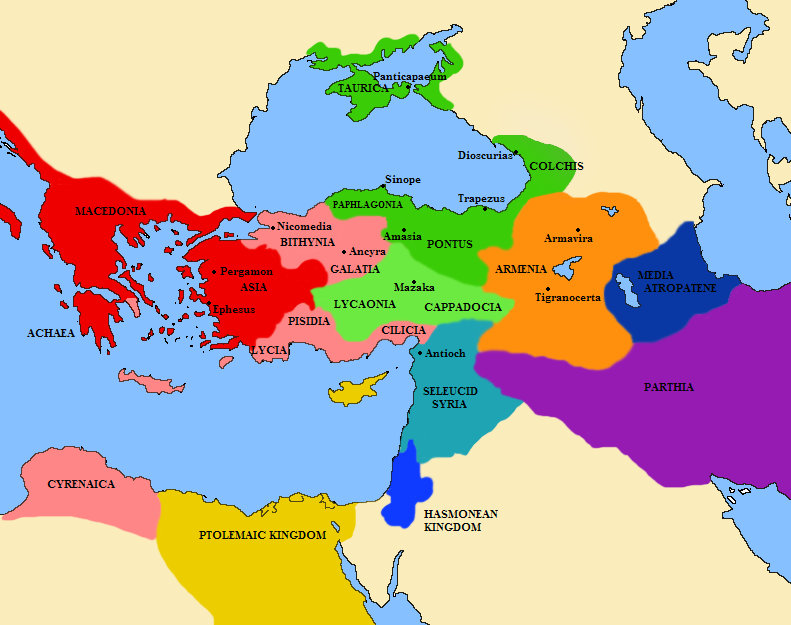
A map of Asia Minor in 89 BC at the start of the First Mithridatic War. Bithynia, light red, is shown as a client kingdom of Rome, dark red. Pontus is shown in dark green. |
Bithynia and Pontus (Latin: Provincia Bithynia et Pontus) was the name of a province of the Roman Empire on the Black Sea coast of Anatolia (Turkey). It was formed during the late Roman Republic by the amalgamation of the former kingdoms of Bithynia (made a province by Rome 74 BC) and Pontus (annexed to Bithynia 63 BC). The amalgamation was part of a wider conquest of Anatolia and its reduction to Roman provinces.
In 74 BC Bithynia was willed to Rome by Nicomedes IV of Bithynia in the hope that Rome would defend it against its old enemy, Pontus. Due to the influence of a guest-friend of Nicomedes, Julius Caesar, then a young man, and an impassioned speech by the deceased king's sister, Nysa before the Senate, the gift was accepted. Rome was divided into two parties, the populares, party of the "people," and the optimates, party of the "best." The guest-friendship had been offered to Caesar, a popular, to save his life by keeping him from Rome during a proscription (a kind of witch-hunt) by Sulla, an optimate in power. Forever after Caesar had to endure scurrilous optimate slander about his relationship to Nicomedes, but Bithynia became a favored project of the populares.
The populares held both consulships at Rome. Marcus Aurelius Cotta was sent to secure the province as governor. He was a maternal uncle of Julius Caesar. Mithridates VI of Pontus, a skilled warrior, seeing a prospective addition to his kingdom about to escape, attacked Bithynia even before the consul arrived. Cotta sent for his co-consul, Lucius Licinius Lucullus. The Third Mithridatic War ensued and dragged on. At the end of their consulships the two commanders stayed on as proconsuls. Mithridates was able to mobilize almost all the rest of Anatolia against them. The two populares were insufficiently skilled to take on Mithridates. Cotta was removed finally by the Senate on a charge of corruption. Lucullus' men mutinied. In the confusion he lost nearly all Anatolia and was out of it. Their patience at an end, the Senate chose the best commander they had. In 66 BC Rome passed the Lex Manilia appointing Pompey, a popular, as Summus Imperator, a term that would find more use after the Civil War. He had the full support of Caesar, then coming into his own. He was to have a totally free hand in Asia. By 64 BC all of Mithridates’ allies had been defeated or forced to change sides. Driven from Pontus, hunted through Anatolia, he was assassinated at last by former friends hoping to win Roman favor.
The wealth of Anatolia was now at Rome’s command. It was Pompey's task to divide it into provinces. He kept the larger regions and combined the smaller city states. Pontus never became a province of its own. It was simply added to its former competitor, Bithynia, while its name was tacked on at the end of Bithynia. This was not a marriage of different cultures. The coast of the Black Sea had long been Hellenized, despite differences of ancestral populations. The new province began in 63 BC. It was of storied wealth and importance to the Republic. Pompey went on to be in the First Triumvirate with his fellow Populares. It was the peak of his career. They had a falling out and fought the Roman Civil War. The last popular standing, Octavian Caesar, assumed the title imperator on a permanent basis and was granted another by the Senate, Augustus. Bithynia and Pontus went on from that date, 27 BC, as an imperial province, a name which it kept. |

